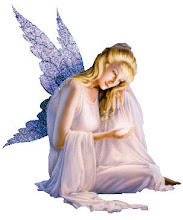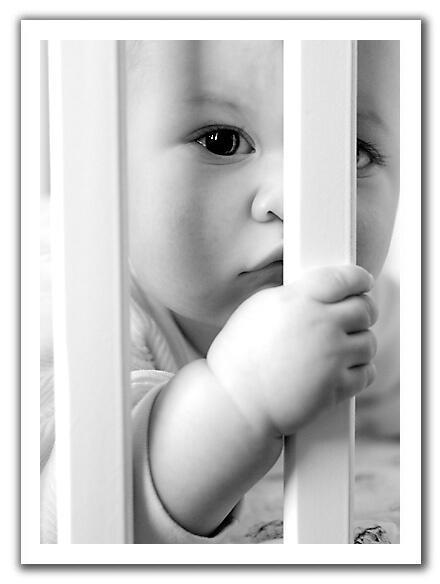The caterer arrived to set up the buffet line at about 5pm. Shortly after, the satay man also came and everything was in good order when our first guests arrived at about 6.30pm. After that, it was a flurry of activities with more and more guests arriving, and numerous phone calls asking for directions to our house. Hubby and I were kept very busy entertaining friends and colleagues, and showing them around the house.
 Yiu Yiu was in excellent mood that night, though she started to show signs of tiredness by 8.30pm. We decided that it was time to bring out the birthday cake as some guests had also started to leave by then. There were plenty of happy faces when the children saw the Barney cake. Yiu Yiu was also very cooperative and we managed to snap some really nice photos of her smiling with the cake. After an enthusiastic birthday song, the cake was cut. Despite my complaints about how it looked, the simple marble cake tasted really nice.
Yiu Yiu was in excellent mood that night, though she started to show signs of tiredness by 8.30pm. We decided that it was time to bring out the birthday cake as some guests had also started to leave by then. There were plenty of happy faces when the children saw the Barney cake. Yiu Yiu was also very cooperative and we managed to snap some really nice photos of her smiling with the cake. After an enthusiastic birthday song, the cake was cut. Despite my complaints about how it looked, the simple marble cake tasted really nice.
Right (top to bottom): With Po-po, Ta Yiyi, Siau Yiyi, Yihao and mummy, Yihao giving birthday girl a kiss, with Aunty Yoke Ling and her family
 There were leftover foods, so many of the guests took home some curry puffs and agar-agar (made by Yiu Yiu's babysitter), chai kueh (which we had ordered separately), fried meehoon, fried rice, and black herbal jelly. The last guests left at about 11.30pm and while I bathed Yiu Yiu and put her to bed, hubby cleaned the house. We only settled into bed at about 1.00am, tired but happy knowing that the party turned out to be mighty successful.
There were leftover foods, so many of the guests took home some curry puffs and agar-agar (made by Yiu Yiu's babysitter), chai kueh (which we had ordered separately), fried meehoon, fried rice, and black herbal jelly. The last guests left at about 11.30pm and while I bathed Yiu Yiu and put her to bed, hubby cleaned the house. We only settled into bed at about 1.00am, tired but happy knowing that the party turned out to be mighty successful.

Pressies galore - mine, mine, they're all mine....muahahaha
 Anyhow, I guess I probably shouldn't sweat the small stuff, and spoil my mood for tonight. I think I'd better expend my energy on making tonight's party a success. Wish me luck, and please sing "Rain rain go away" for me.
Anyhow, I guess I probably shouldn't sweat the small stuff, and spoil my mood for tonight. I think I'd better expend my energy on making tonight's party a success. Wish me luck, and please sing "Rain rain go away" for me.






 I ended up buying some local handicrafts – knitted floral hair clips and trinket boxes. I also saw some unique photo frames, decorated with small pieces of coloured stones but the price was quite steep. I walked along to see if there's another stall selling the similar items but there were none. Unfortunately when I went back to the stall, the owner had already packed up and left. I'll leave you with a photo of the frames, the one that slipped through my fingers.
I ended up buying some local handicrafts – knitted floral hair clips and trinket boxes. I also saw some unique photo frames, decorated with small pieces of coloured stones but the price was quite steep. I walked along to see if there's another stall selling the similar items but there were none. Unfortunately when I went back to the stall, the owner had already packed up and left. I'll leave you with a photo of the frames, the one that slipped through my fingers.
 Near the summit of Doi Suthep is Wat Phrathat Doi Suthep. Located 3520 feet above sea level, it was first established in 1383 and is one of the north most sacred temples. According to legend, holy relic of Buddha were discovered during the reign of King Kuena (1355 – 1385). The king placed the relics on a howdah on the back of an auspicious white elephant, and vowed that a temple will be built to hold the relics at the spot where the elephant stopped. The elephant wandered freely, headed to Doi Suthep and stopped at the top of the mountain. The elephant died after fulfilling its duty of finding a proper place for the holy relic. The temple can be reached by foot by climbing a 306-step staircase, bordered by a Naga balustrade. One can also ascend by the funicular railways. Inside the temple is a Lanna style chedi covered with engraved gold plates containing the holy Buddha relics, flanked by four ornamental umbrellas. The temple compound also offers an exhilarating view of Chiang Mai city and its surrounding countryside.
Near the summit of Doi Suthep is Wat Phrathat Doi Suthep. Located 3520 feet above sea level, it was first established in 1383 and is one of the north most sacred temples. According to legend, holy relic of Buddha were discovered during the reign of King Kuena (1355 – 1385). The king placed the relics on a howdah on the back of an auspicious white elephant, and vowed that a temple will be built to hold the relics at the spot where the elephant stopped. The elephant wandered freely, headed to Doi Suthep and stopped at the top of the mountain. The elephant died after fulfilling its duty of finding a proper place for the holy relic. The temple can be reached by foot by climbing a 306-step staircase, bordered by a Naga balustrade. One can also ascend by the funicular railways. Inside the temple is a Lanna style chedi covered with engraved gold plates containing the holy Buddha relics, flanked by four ornamental umbrellas. The temple compound also offers an exhilarating view of Chiang Mai city and its surrounding countryside.


 A couple kilometers away, a dirt road leads us to a nearby Hmong (Maew) hill-tribe village. The Hmong are Thailand's second largest hill-tribe group after the Karen. I was expecting to witness the Hmong people in their tradition costumes going about their daily lives but I was grossly disappointed. The village looks like any other villages, with numerous handicrafts stalls, and only a handful of people wearing their traditional black jackets. I bought a pair of Hmong traditional costume for Yiu Yiu and Yihao.
A couple kilometers away, a dirt road leads us to a nearby Hmong (Maew) hill-tribe village. The Hmong are Thailand's second largest hill-tribe group after the Karen. I was expecting to witness the Hmong people in their tradition costumes going about their daily lives but I was grossly disappointed. The village looks like any other villages, with numerous handicrafts stalls, and only a handful of people wearing their traditional black jackets. I bought a pair of Hmong traditional costume for Yiu Yiu and Yihao.
 We rounded up the day with a shopping trip to Chiang Mai Night Bazaar after the welcome dinner. The Night Bazaar is a legacy of the original Yunnanese trading caravans that stopped here along the ancient trade route. It is a multi- block area with dozens of street vendors offering a huge variety of Thai and northern Thai goods, as well as fake and authentic designer goods.
We rounded up the day with a shopping trip to Chiang Mai Night Bazaar after the welcome dinner. The Night Bazaar is a legacy of the original Yunnanese trading caravans that stopped here along the ancient trade route. It is a multi- block area with dozens of street vendors offering a huge variety of Thai and northern Thai goods, as well as fake and authentic designer goods.




 Perhaps I should consider buying this for hubby for the festive season. That's a conniving way to get something for myself in the disguise of buying gifts for him.
Perhaps I should consider buying this for hubby for the festive season. That's a conniving way to get something for myself in the disguise of buying gifts for him.








